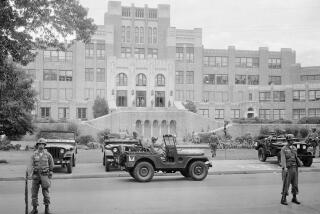Jefferson Thomas dies at 67; one of the Little Rock Nine who integrated Central High School
- Share via
Jefferson Thomas, one of nine students who in 1957 integrated a Little Rock, Ark., high school, a turning point for the civil rights movement, has died. He was 67.
Thomas, who lived much of his adult life in Los Angeles, died Sunday of pancreatic cancer at an extended care facility in Columbus, Ohio, according to a statement Monday from the Little Rock Nine Foundation. Terrence Roberts and Melba Pattillo Beals, fellow Little Rock Nine students, said Thomas also had a history of heart problems.
The integration of Little Rock’s all-white Central High School was a first real measure of the federal government’s ability to enforce a 1954 Supreme Court ruling that said separate but equal schools were unconstitutional. It also became an ugly and violent chapter in the nation’s history.
President Eisenhower ordered in the Army’s 101st Airborne Division after Arkansas Gov. Orval Faubus sent National Guard troops to block Thomas and eight other African American students from entering the school.
“I never thought it would be a problem,” Thomas told The Times in 1987, when he was working at a Defense Department office in El Segundo. His family moved to Los Angeles after he graduated from Central High. “I had no reason to think that the quiet, peaceful place where I grew up could change so drastically.”
Each of the nine Little Rock students — Thomas, Roberts, Beals, Elizabeth Eckford, Ernest Green, Gloria Ray Karlmark, Carlotta Walls LaNier, Minnijean Brown Trickey and Thelma Mothershed Wair — received Congressional Gold Medals in 1999 from President Clinton, a former Arkansas governor who said the students “became our teachers. And because they taught us well, we are a better country.”
Thomas “was a straight, ordinary, next-door-living kind of guy” with a wonderful sense of humor, Beals said Monday.
“He had this ability to keep things in perspective, used a lot of humor and was great at telling stories,” Roberts said. “We talked often about how things went for us in life, and Jeff was a very satisfied person.”
Thomas was born Sept. 19, 1942, the youngest of seven children. He volunteered to go to Central High beginning in his sophomore year because he wanted to improve his chances of attending college.
“I took a lot of abuse. But I made it a challenge to think every day, ‘You can’t make me quit,’” Thomas told the Columbus Dispatch in 2000.
He stayed in Little Rock the next year after Faubus closed the school. Thomas took correspondence courses, then he and LaNier returned for the 1959-60 school year and graduated from Central in May 1960.
Thomas told The Times his father lost his job as a salesman for International Harvester after refusing to move his son out of Little Rock. The family eventually moved to Los Angeles and Thomas spent a year at Wayne State University before joining his family.
In the 1960s, Thomas earned a bachelor’s degree in business administration from what is now Cal State Los Angeles. He also helped his father run a family business and worked for Mobil Oil as an accounting clerk, according to his biography on the Little Rock Nine Foundation’s website.
He was drafted into the Army in 1966 and served in Vietnam.
“In my life there have been two periods of time that were very trying: Central High and Vietnam,” he told The Times in 1987.
When Mobil moved its credit card operations to Kansas City, Mo., Thomas stayed in Southern California and joined the Defense Department as an accounting clerk. He moved to Columbus in 1989 to continue working for the department.
“Even at such a young age, he had the courage to risk his own safety, to defy a governor and a mob, and to walk proudly into that school even though it would have been far easier to give up and turn back,” President Obama said in a statement Monday. “Our nation owes Mr. Thomas a debt of gratitude.”
Roberts said the Little Rock Nine showed “how important it is to confront the status quo. I don’t think we moved the needle very far … but we did demonstrate how important it is to confront the system.”
In a 2000 interview, Thomas recalled his experiences at Central High.
“People remember it today because of the violence,” he told the Columbus Dispatch. “But we survived and made it through on non-violence. If we did it against those odds, it’s possible for anyone to live today without violence.”
Thomas’ survivors include his wife, Mary; a son, Jefferson Jr.; stepchildren Frank and Marilyn; three brothers and three sisters; a grandchild; and a great-grandchild, LaNier said.
Celebrations of his life are being planned in Los Angeles and Columbus, Beals said.
keith.thursby@latimes.com
More to Read
Start your day right
Sign up for Essential California for the L.A. Times biggest news, features and recommendations in your inbox six days a week.
You may occasionally receive promotional content from the Los Angeles Times.






